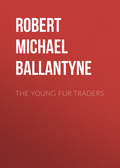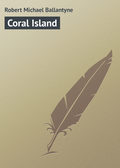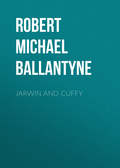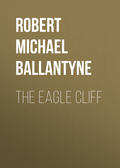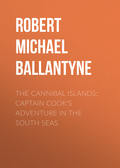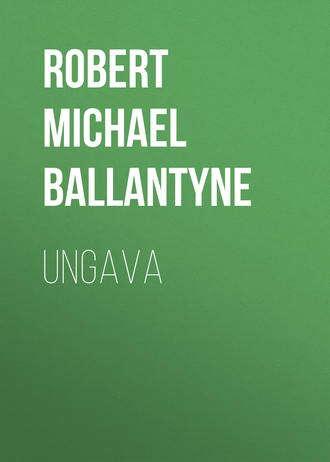
Robert Michael Ballantyne
Ungava
Chapter Twenty Five.
Buried alive—But not killed—The giant in the snow-storm
The event which prevented the excursion referred to in the last chapter was neither more nor less than a snowstorm. “Was that all?” say you, reader? Nay, that was not all. Independently of the fact that it was a snowstorm the like of which you have never seen, unless you have travelled in northern climes, it was a snow-storm that produced results. Of these, more hereafter.
The storm began with a sigh—a mysterious sigh, that swept over the mountains of Ungava with a soft, mournful wail, and died slowly away in the distant glen of the Caniapuscaw, as if the spirit of the north wind grieved to think of the withering desolation it was about to launch upon the land.
The gathering clouds that preceded and accompanied this sigh induced Frank Morton to countermand his orders for the intended journey. In order to console Edith for the disappointment, he went with her into the hall, and, drawing a low stool towards the blazing stove, placed a draught-board upon it. Then he placed another and a lower stool beside the first, on which he seated Edith. Spreading a deerskin robe upon the ground, he stretched himself thereon at full length, and began to arrange the men.
The hall, which was formerly such a comfortless apartment, was now invested with that degree of comfort which always gathers, more or less, round a place that is continually occupied. The ceiling was composed of a carpet of deerskin stretched tightly upon the beams. The walls were hung all round with the thick heavy coats and robes of leather and fur belonging to the inmates, and without which they never ventured abroad. The iron stove in the centre of the apartment, with its pipe to conduct away the smoke, and its radiant fire of logs, emitted a cheerful glow in its immediate vicinity; which glow, however, was not intense enough to melt the thick ice, or rather hoar-frost, an inch deep, with which the two windows were encrusted, to the almost total exclusion of the view and the serious diminution of the light. The door was padded all round its edges with fur, which tended to check the bitter wind that often blew against it, and tempered the slight draught that did force its way through. Altogether the hall at Fort Chimo was curious and comfortable—rather shaggy in its general appearance, but sound and trustworthy at bottom.
A small rough table, the work of Frank Morton, stood close to the stove; and beside it was seated Mrs Stanley, with a soft yellow deerskin before her, which she was carefully transforming into a hunting coat for her husband. On another and a larger table was spread the tea equipage. Those who would understand this aright must for tea read supper. Among fur-traders the two are combined. Candles—dips made at the fort—had been brought some time ago by La Roche, who entered the hall by a back door which communicated with a passage leading to the kitchen behind.
“What can have become of papa, I wonder?” Mrs Stanley designated her husband by this epithet, in consequence of her desire to keep up the fiction of her being Edith’s little sister or playfellow.
Frank looked up from the board. “I know not,” said he. “I left him giving some orders to the men. We have been getting things made snug about the fort, for we expect a pretty stiff breeze to-night.—Take care, Eda; your crown’s in danger.”
“Oh! so it is,” cried Edith, snatching back her piece, and looking with intense earnestness at the board.
Frank might have observed, had he not been too deeply engaged with his game, that the expected stiff breeze had already come, and was whistling round the fort with considerable vigour.
“You’ll beat me, Eda, if you play so boldly,” said Frank, with a smile. “There, give me another crown.”
“And me too,” said Edith, pushing up her piece. As she spoke, the door burst open, and Stanley sprang into the room.
“Whew! what a night!” he cried, shutting the door with a forcible bang, in order to keep out the snow-drift that sought to enter along with him.
Two moves would have made Frank the conqueror, but the gust of wind upset the board, and scattered the men upon the floor.
Stanley looked like a man of white marble, but the removal of his cap, coat, and leggings produced a speedy and entire metamorphosis.
“Ho! La Roche!”
“Oui, monsieur.”
“Here, take my coat and shake the snow off it, and let’s have supper as speedily as may be. The draughts without, Frank, are a little too powerful for the draughts within, I fear.—What, wife, making another coat? One would think you had vowed to show your affection for me by the number of coats you made. How many have you perpetrated since we were married?”
“Never mind; go and put on one now, and come to supper while it is hot.”
“I’m glad it is hot,” cried Stanley from his bedroom. “One needs unusual heat within to make up for the cold without. The thermometer is thirty below.”
While the party in the hall were enjoying their evening meal, the men were similarly employed beside the stove in their own habitation. There was not much difference in the two apartments, save that the confusion in that of the men was much greater, in consequence of the miscellaneous mass of capotes, caps, belts, discarded moccasins, axes, guns, and seal-spears, with which they saw fit to garnish the walls. The fumes of tobacco were also more dense, and the conversation more uproarious.
“’Tis a howlin’ night,” observed Massan, as a gust of more than usual violence shook the door on its hinges.
“Me t’ink de snow-drift am as t’ick in de sky as on de ground,” said Oolibuck, drawing a live coal from the fire and lighting his pipe therewith.
“Hould on, boys!” cried Bryan, seizing his chair with both hands, half in jest and half in earnest, as another blast shook the building to its foundation.
The two Indians sat like statues of bronze, smoking their calumets in silence, while Gaspard and Prince rose and went to the window. But the frozen moisture on the panes effectually prevented their seeing out.
It was indeed an awful night—such a night as had not, until now, visited the precincts of Fort Chimo. Viewed from the rocky platform on the hill, the raging of the storm was absolutely sublime. The wind came sometimes in short, angry gusts, sometimes in prolonged roars, through the narrows, sweeping up clouds of snow so dense that it seemed as though the entire mass had been uplifted from the earth, hurling it upwards and downwards and in circling eddies, past the ravines, and round the fort, and launching it with a fierce yell into the valley of the Caniapuscaw. The sky was not altogether covered with clouds, and the broken masses, as they rolled along, permitted a stray moonbeam to dart down upon the turmoil beneath, and render darkness visible. Sometimes the wind lulled for a second or two, as if to breathe; then it burst forth again, splitting through the mountain gorges with a shriek of intensity; the columns of snow sprang in thousands from every hollow, cliff and glen, mingled in wild confusion, swayed, now hither, now thither, in mad uncertainty, and then, caught by the steady gale, pelted on, like the charging troops of ice-land, and swept across the frozen plain.
Could human beings face so wild a storm as this? Ay, they could—at least they could dare to try!
There was one traveller out upon the hills on that tremendous night. The giant was in the midst of it; but weak as the bulrush were the mighty limbs of Maximus before the rushing gale. Several days previous to this the Esquimau had been sent down to his brethren at False River, to procure some seal-meat for the dogs, and to ascertain the condition of the natives and their success in fishing. On arriving, he found that they had been so far successful, that starvation (their too frequent guest) had not yet visited their dwellings of snow. But Maximus found the old woman who had formerly saved his life very ill, and apparently about to die. Having learned from experience the efficacy of Stanley’s medicines, he resolved to procure some for the old woman, whom he had tenderly watched over and hunted for ever since the eventful day of the attack. His dogs were exhausted, and could not return. But the bold Esquimau was in the prime of life, and animated by the fire of vigorous youth. The storm was beginning to mutter in the distance. What then?—Had he not faced the blasts of the frozen regions many a time before?—Without saying a word, he threw a junk of seal-flesh into his wallet, and, striding back upon his track at the mountain’s base, he disappeared in the driving snow.
Before reaching the fort, however, the full fury of the storm had burst upon him. It cast him headlong into the snow; but he rose and staggered on. Again it burst forth, and again he fell before it like a stately pine. Rising to his knees, Maximus draw the hood of his hairy garment close round his head and face, and tried to peer through the driving snow; but he could not see until a slight lull came; then he observed a hummock of ice at a short distance, and, rising, made towards it. The lulls were short-lived, however. The storm threw him down again; instantly he was drifted over with snow; another blast came, lifted the drift into the air, and left the Esquimau exposed to all its fury. But Maximus was not conquered. He rose again, panting, it is true, but sturdy as ever, and ready to take advantage of the next lull. It came soon; and he saw a rock, or, it might be, the base of a cliff close at hand. With a quick run he reached it; and, going down on his knees, began with his gloved hands to scrape a hollow in the snow. Having made a hole big enough to contain his body, he lay down in it, and, pulling the superincumbent snow down upon him, was almost buried in the ruin. Scarcely had he drawn the hood of his coat well over his face, when another burst of the storm dashed a column of curling drift upon the rock, and the place where he lay was covered up; not a wrinkle in the drift remained to mark the spot where he was buried!
All that night the storm roared among mountains with bitter fury; but next day the wind was subdued, and the sun shone brightly on the grey rocks and on the white wreaths of snow. It shone in all the lustre of an unclouded winter sky. Not only did the sun smile upon the scene, but two mock suns or parhelia, almost as bright as himself, shone on either side of him. Yet no ray of light illuminated the dwellings of the fur-traders. All was darkness there, until Stanley rose from his couch and lighted a candle, for the purpose of examining his watch.
“Hallo! Frank, Frank!” he cried, entering the hall, while he hastily threw on his garments; “turn out, man; there’s something wrong here. ’Tis past noon, and dark as midnight. Bring your watch; perhaps I’m wrong.”
Frank yawned vociferously, and sprang from his bed. In two seconds more he made his appearance in his trousers and shirt.
“Past twelve, no doubt of – yea-o-ow! That accounts for my waking three times and going off again; but—”
“Hey! what have we here?” cried Stanley, as he opened the front door, and disclosed to view a solid wall of snow.
“Snowed up; dear me! eh! that’s odd,” said Frank, beginning to comprehend the state of matters.
Snowed up they were, undoubtedly; so thoroughly snowed up that there was not a ray of daylight within their dwelling. Had Frank been above the snow, instead of below it, he would have seen that the whole fort was so completely buried that nothing was visible above the surface except the chimneys and the flagstaff. After the first few moments of surprise had passed, it occurred to Stanley that they might ascend to the regions above by the chimney, which was wide enough, he thought, to admit a man; but on looking up, he found that it also was full of drifted snow. This, however, could have been easily removed; but there was a bar of iron stretching across, and built into the clay walls, which rendered escape by that passage impossible.
“There’s nothing for it, Frank, but to dig ourselves out, so the sooner we begin the better.”
By this time they were joined by Edith and her mother, who, although much surprised, were not at all alarmed; for rough travelling in a wild land had taught them to regard nothing as being dangerous until it was proved to be so. Besides, Stanley had assured them that they had nothing to fear, as the only evil he anticipated would be the trouble they were sure to have in getting rid of the superabundant snow. While they were talking, the back door was opened violently, and La Roche, in a state of dishabille, burst into the room.
“O messieurs, c’est fini! Oui, le world him shut up tout togedder. Oh, misere! Fat shall ye to do?”
“Hold your tongue, La Roche,” said Frank, “and bring the kitchen shovel.”
The cook instantly turned to obey, and as he rushed towards the kitchen his voice was heard exclaiming in the passage—
“Ah, c’est terrible! Mais I ver’ moshe fear de shovel be out in de neige. Ah, non; here it is. C’est bien.”
Returning in haste to the hall, he handed a much dilapidated iron shovel to Frank, who threw off his coat and set to work with vigour. The tables and chairs, and all the furniture, were removed into the inner apartments, in order to afford room for the snow which Frank dug from the open doorway and shovelled into the centre of the room. As only one at a time could work in the narrow doorway, the three men wrought with the shovel by turns; and while one was digging the tunnel, the other two piled the débris in a compact mound beside the stove. As no fire had yet been kindled, the snow, of course, did not melt, but remained crisp and dry upon the floor. Meanwhile Edith looked on with deep interest, and occasionally assisted in piling the snow; while her mother, seeing that her presence was unnecessary, retired to her own room.
“There,” cried Frank, pausing and surveying an immense cavern which he had dug into the drift, “that’s a good spell. Take a turn now, La Roche, and dig upwards; we should see daylight soon.”
“Ah, vraiment, it be time, for it am von o’clock,” replied La Roche, as he plied the shovel.
The tunnel was cut in such a way as that, while it ran outwards, it also sloped upwards; and, from the angle at which it lay, Stanley calculated that thirty feet or thereabouts would bring them to the surface. In this he was correct, for when La Roche had worked for half an hour, the snow above became slightly luminous. But the labour of conveying it from the end of the tunnel into the hall became, of course, greater as the work advanced. At length the light penetrated so clearly that La Roche was induced to thrust his shovel upwards, in the expectation of penetrating the mass. The effect of this action was striking and unexpected. Instantly the roof fell in, and a flood of sunshine poured into the tunnel, revealing the luckless Frenchman struggling amid the ruins.
“Oh, pull me hout!” he spluttered, as Frank and Stanley stood laughing heartily at his misfortune. One of his legs happened to protrude from the mass as he made this earnest request; so Frank seized it, and dragged the poor man by main force from his uncomfortable position. Immediately afterwards they all three scrambled through the aperture, and stood in open day.
The sight that met their eyes was a curious though not a satisfactory one. All that remained visible of Fort Chimo were, as we have said, the chimneys and the flagstaff. In regard to the general aspect of the neighbourhood, however, there was little alteration; for the change of position in the drifts among the mountain gorges, and the addition to their bulk, made no striking alteration in the rugged landscape. In some places the gale had cleared the sides of the mountains and left their cliffs exposed to view; in other spots the gorges and ravines were choked up, and the pine tops nearly covered; and the open water in the lake was more encumbered than usual with icebergs.
“Now, La Roche,” said Stanley, after they had surveyed the desolate scene for a few minutes in silence, “go fetch the shovel and we’ll dig out the men. I daresay, poor fellows, they’re beginning to wonder at the length of the night by this time.”
La Roche prepared to descend into the tunnel, when their attention was arrested by a strange sound beneath the snow. In a few minutes the crust began to crack at a spot not more than two yards from where they stood; then there was a sudden rupture, accompanied by a growl, and followed by the appearance of the dishevelled head and arms of a man.
“Musha, boys, but I’m out!” Bryan coughed the snow from around his mouth, and winked it from his eyes, as he spoke. The first sight that met his bewildered gaze was three pair of expanded eyeballs and three double rows of grinning teeth, a few feet from his face. Uttering a cry of terror, he fell back into the hole, the snow closed over him, and he was gone!
It need scarcely be added that Frank and Stanley commenced to dig into this hole with as much vigour as their frequent explosions of laughter would allow. In a few minutes it was re-opened, and the men issued one by one from durance vile.
“Och, sirs, ye gave me a mortial start!” exclaimed Bryan, as he rose to view the second time. “I thought for sartin ye were all polar bears. Faix we’ve had a job o’t down there. I’ll be bound to say there’s twinty ton o’ snow—bad luck to it—in the middle o’ the floor.”
“There’s work for us here that’ll last two weeks, I guess,” said Massan, as he and several of the others stooped down and gazed into the tunnel leading to the hall, at the end of which Edith’s laughing face met their view.
“When did you awake, and begin to suspect that something was wrong?” inquired Stanley of Dick Prince.
“Awake!” cried Bryan, answering the question; “we awoke at laste a dozen times. I suppose it must have bin the time for brikfust; for, ye see, although we could ha’ slept on long enough; our intariors couldn’t, be no manes, forgit their needcessities.”
“We shall have to work a bit yet ere these necessities are attended to, I fear,” said Stanley. “Go, François, and one or two of you, and open up the dog-kennel. The rest of you get all the shovels you can lay hands on, and clear out the houses as fast as you can.”
“Clear out de chimbleys fust, mes garçons,” cried La Roche, looking up from the tunnel. “Den ve vill git dejeuner ready toute suite.”
“That will we, lad,” said Bryan, shouldering a spade and proceeding towards the chimney of the hall; while the rest of the party, breaking up into several groups, set to work, with spades, shovels, and such implements as were suitable, to cut passages through the square of the fort towards the doors of the several buildings. As Massan had said, it proved to be no light work. The north-west gale had launched the snow upon the exposed buildings of Fort Chimo until the drift was fifteen or sixteen feet deep, so that the mere cutting of passages was a matter of considerable time and severe labour.
Meanwhile, Maximus awoke, and sought to raise himself from his lair at the foot of the rock. But his first effort failed. The drift above him was too heavy. Abandoning, therefore, the idea of freeing himself by main force, he turned round on his side and began to scrape away the snow that was directly above his head. The masses that accumulated in the course of this process he forced down past his chest; and, as his motions tended to compress and crush the drift around him in all directions, he soon made room enough to work with ease. In ten minutes he approached so near to the surface as to be able, with a powerful effort, to burst it upwards, and step out of his strange dormitory into the sunshine.
This method of spending the night has been resorted to more than once by arctic travellers who had lost their way; and it is sad to think that many who have perished might have saved their lives had they known that burrowing could be practised with safety. The Esquimaux frequently spend the night in this manner, but they prefer building a snow-house to burrowing, if circumstances will permit.
Cutting a slice of seal-meat, and eating as he went, Maximus resumed his journey, and soon afterwards arrived at the fort, where he found the men busied in excavating their buried dwellings.
Here he stated the case of the old woman, and received such medicines as Stanley, in his amateur medical wisdom, saw fit to bestow. With these he started immediately to retrace his steps, having been directed to proceed, after administering them, to the lake where Frank meant to try the fishing under the ice. A family of Esquimaux had been established on another lake not so far distant from the fort; and having been taught by the fur-traders how to set nets under the ice, they succeeded in procuring more than enough for their subsistence. It was hoped, therefore, that the larger lake would afford a good supply; and, the weather having become decidedly fine, Frank prepared to set out on the following day.



